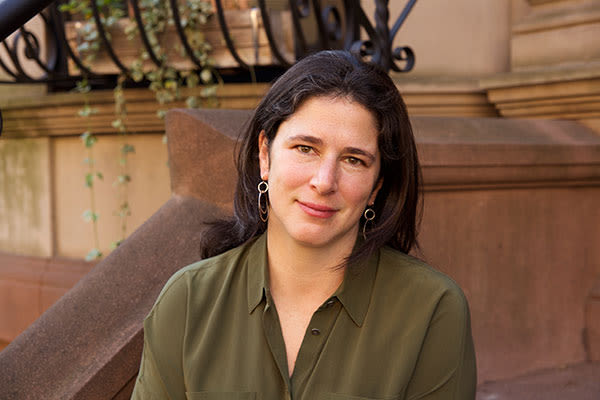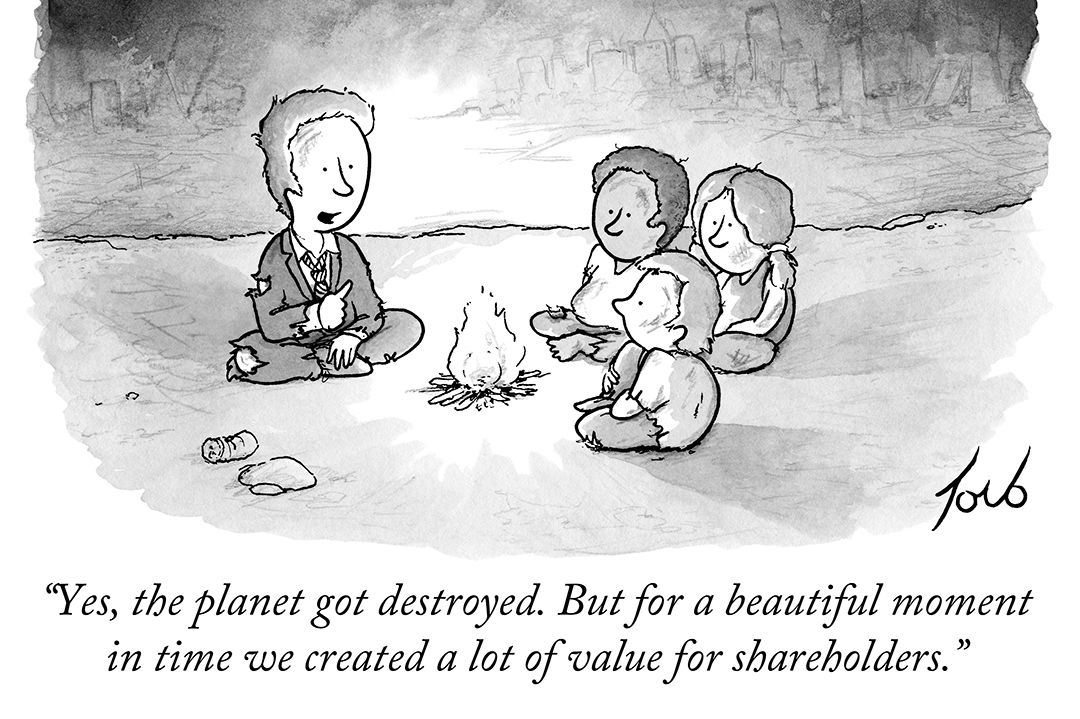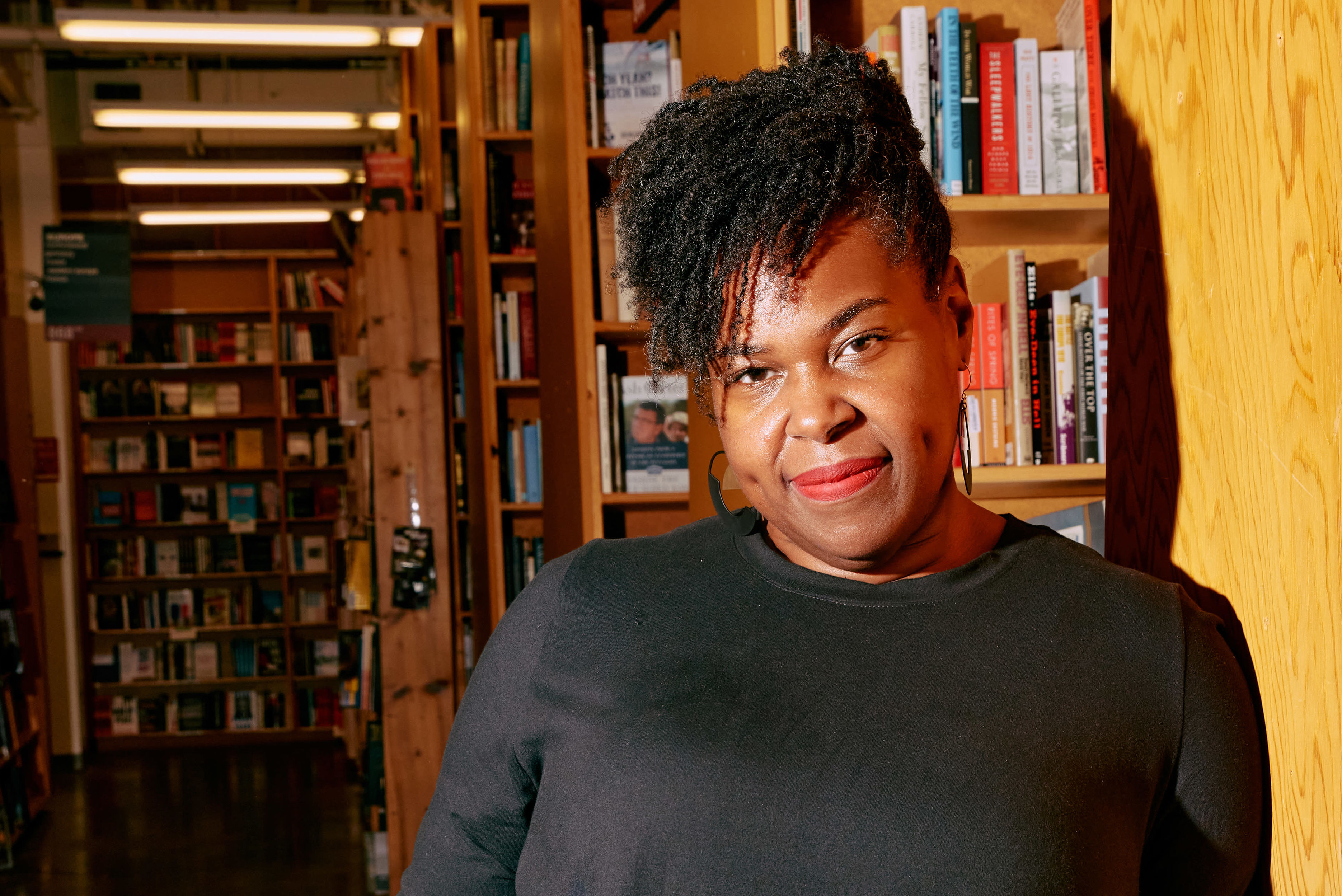Single Women Are Changing America, Says Rebecca Traister

Rebecca Traister
Image: Eliza Long
Rebecca Traister isn't a single lady. But she was, and for a while: the journalist didn't marry until age 35. And Traister is one of a growing number of American women who are deferring (or foregoing) marriage, a phenomenon she documents in her smart and reflective new book, All the Single Ladies: Unmarried Women and the Rise of an Independent Nation.
Traister is a writer at large for New York Magazine, and author of 2010's Big Girls Don't Cry, which looks at women in the 2008 presidential campaign. All the Single Ladies starts from a remarkable statistic: today, only 20 percent of Americans between 18 and 29 are married, compared to nearly 60 percent in 1960. From there, Traister charts the influence single women have had throughout history, and the ways in which they've been marginalized. (For more, read the New York Magazine story adapted from the book.)
Traister hits Portland this week, appearing on Live Wire! on Wednesday, March 9 before giving a reading at Powell's on Friday, March 11. We talked with her about the vital role of female friendship, how single women are good for America, why Hillary Clinton isn't apologizing any more, and the bogus sexism shield you've definitely encountered.
You point out that this isn’t the first time we’ve seen a spike in the numbers of single women, but it’s still unprecedented—there are more unmarried women now than ever before. What else makes this moment different or significant?
What makes the moment different are the same factors that permit it to be as big as it is, which is that women have increased opportunity for equality in all kinds of realms—participation in the workforce, their power as earners, certainly in terms of their sexual liberty. And the other thing that makes the moment unusual—or not unusual, because it’s the story of the United States—is that lots of these things remain imperiled or are newly imperiled. Things like, what’s going to happen to the Supreme Court?
What happens to women living independently of marriage in this country will be changed pretty dramatically over the next 50 to 100 years depending on all sorts of judicial decisions, about everything from voting rights to reproductive rights to the continuation of programs like affirmative action. You see restrictions on abortion rights all over the country getting more and more intense—that limits women’s ability to live freely. You see pushback against a lot of the strides made by the gay marriage movement. You see, from some sectors, a desire to reduce state benefits and social welfare policies, a desire to cut into social security. All these larger government things in the balance right now will have a big impact on the ability of women living outside of the institution that historically contained them, and on which they were historically more dependent than they are now.
So is there currently more at stake for unmarried American women?
I think there’s always an enormous amount at stake for women in the United States—I can’t think of a period in United States history when the place of women hasn’t hung in the balance. But with such a dramatic increase in the number of women living independently, we’re also seeing pushback against that—for example, the people agonizing about the impact of a lower birthrate, and what they say is our shrinking population and our national well-being. There’s Ross Douthat at the New York Times, or Jonathan Last, who wrote a book about it. That’s coming from socially conservative fears, this constant refrain that the cure for poverty is marriage.
Look: the drive to address economic inequality is so great that it’s driving the Democratic primary. But the insistence from conservative sectors that the cure for poverty is marriage is as loud as it’s ever been, even when all evidence says that’s not the case, and in fact the reverse is true—that lifting people out of poverty is probably one of the only things that would have a positive impact on the marriage rate.
And if it feels particularly fraught right now, it’s because women are exerting so much independent power. Because we’re on an upward trajectory when it comes to liberty, it seems like we’ve never been as powerful as we are now—but that’s because we’re starting from a pretty low bar.
Amid all this fretting about women leading independent lives and not having enough children, you point to many ways that single women are actually really good for America.
They’re wonderful for America! If you believe in equal opportunity, single women are doing tremendous work, and often at great cost to themselves. Forty-two percent of single mothers live below the poverty line. In large part, they’re unmarried in response to economic necessity. But increasing numbers of unmarried women are forcing a reckoning with women as independent forces—as political, economic, reproductive, sexual entities in the United States. They’re forcing a reckoning with the idea that women are fully human, which has been a long time coming in the United States. So much of our policy, so much of our law, has so thoroughly circumscribed the rights of women throughout our history that the fact that they’re living outside of the institution on which they had always been forced to depend—that’s forcing a reckoning with women as equally viable adults.
But it’s slow, and we’re in the middle of it, and there are a lot of people who are living in extreme poverty while it’s happening. So I don’t want to say, “Oh yeah, an army of cheerful single people are out there changing the world!” No: part of what’s being forced is that there are millions of women who need the government to change its policies.
That’s a strength of your book—you don’t just write about privileged white women newly choosing to be single, but also the poor and minority women who’ve long lived outside of marriage.
In saying it’s not all Sex and the City women, to use that shorthand, I don’t want to discount the power of those women. Because when the behavior begins to trickle upwards and is performed by more privileged women—by higher-income women who are closer to power—you get people like [US Senator] Kirsten Gillibrand. Now, she’s not single—she’s married, but she’s late married by historical standards, and she had her second kid when she was 42 and already in Congress. Is it an accident somebody like Kirsten Gillibrand is pushing through the Family Act, which mandates paid leave? I don’t think so. Even though it is frustrating that a lot of the more privileged and predominantly white women get credited as the liberating symbols of new kinds of freedom that were often pioneered by less privileged women, it is also true that their heightened visibility does work to make us confront new kinds of radical behavior.
You write about the vital role of female friendship, while also noting the suspicions or aspersions that have been cast on it throughout history. Often, we think of female relationships as competitive and catty—you mention the Betty-Veronica dynamic in your book. Why has there been this fear or disdain of female friendships?
There’s a huge history of female friendship. In periods in American society where men and women were raised so differently and in separate spheres, and where limitations on youthful sexual interactions discouraged them from spending time together as adolescents, young women bonded really closely with each other. Pairs of young women were said to be “smashed.” This was encouraged, especially as women went into boarding schools and began to work in factories in the 19th century. At this time, middle-class white women started to marry at higher ages or less frequently, because so many men had gone west as part of the westward migration, and also so many had lost their lives in the Civil War. Women formed things like Boston marriages—pairs of women who lived together domestically, in some cases also romantically or sexually.
A lot of these women became partners and co-conspirators, and especially around the turn of the century, a lot of them worked together as reformers. It was women working together who worked for the abolition of slavery, who worked for suffrage, who went on strikes and walkouts during the early part of the labor movement, who founded settlement houses together, who founded colleges together. In fact, there was one anti-feminist pundit at the beginning of the 20th century who referred to women together as “shrieking sisterhood.” There was a real anxiety about what women might do together.
What changed?
In the middle of the 20th century, women were pushed back into very traditional hetero domestic roles. So by the time the second wave propelled more women into workplaces, there were so few of them. I think that set up the reinscription of the idea that the woman’s prize was a man, whether a boyfriend or a husband, and that fueled some degree of competition. And though women began to enter the workforce in greater numbers, there were still so few, so there was a sense of competition from that, too—both women and men felt there was only room for a few at the beginning.
Now, as women’s economic participation becomes more of the norm, there’s less competition for space—and the imperative of finding a man or a husband has been lifted somewhat. It’s far easier for young women, whether in schools or workplaces, to return to their roles as allies, friends, perhaps co-conspirators, and to not view each other as competition. That’s something (Call Your Girlfriend podcast hosts) Ann [Friedman] and Amina [Sow] talk about all the time in terms of Shine Theory.
Right, the idea that smart and powerful women make the best friends. But it remains the case that friendships aren’t formalized in the way romantic partnerships so often are, so how do we bring more attention to their value?
I wish there was more of an acknowledgment of how serious these relationships are, because I think we still regard them as frivolous and as adornment, but not necessarily as legitimate relationships in which women grow, which permit them to thrive as adults, and on which they depend. Amina is somebody who said, “There are no tax breaks for friends.” It’s true, and I don’t know how you go about legislating that—and given that we don’t even have paid leave or a higher minimum wage, I think it’s very unlikely we’re going to start getting into tax breaks for friends.
Let’s talk about Hillary Clinton. When you were interviewed on Call Your Girlfriend in November, you said this was a happy time for the Democratic Party in terms of presidential politics. Are you still feeling so optimistic?
Yeah, I feel great about the Democratic Party. I have said throughout that a robust primary was going be great for everybody involved. I’m somebody who likes both of the Democratic candidates very much: my idealistic politics are probably closer to Bernie’s; my ideas about pragmatism and who might be better suited to the actual job in question probably leads me to be more sympathetic to Hillary. I’d be thrilled to support either one.
I love that they’ve moved the conversation so far to the left. It’s radical, whether it’s Bernie talking about a $15 minimum wage or Hillary talking about the Hyde Amendment, which I never thought I’d hear in my lifetime—it’s a thrilling development. If there hadn’t been a competitive primary, nobody would care. I know the popular narrative is: “Nobody likes Hillary. Nobody is enthusiastic.” I don’t believe that to be the case. I certainly think they’re enthusiastic enough that they just voted for her overwhelmingly in South Carolina.
What sorts of differences have you noticed about Hillary’s campaign this time around, especially when it comes to her identity as a woman?
She’s been much less apologetic and much more open about being a woman, which is great. I don’t love the rhetorical strategy of responding to the establishment hit by saying, “How can I be establishment? I’m a woman.” It’s true on its merits, and I get why she says it, but I don’t think it answers the fundamental critique.
But the way she’s dealt with the question of the generational difference between women has been inspiring and elegant, and I just want to give her a perfect 10 every time she pulls it off. She is repeatedly asked some version of: “People hate you. Respond.” It must be incredibly difficult after 30 years to come up with anything short of biting somebody’s head off. But this particular iteration has been particularly punishing, because it’s like, “Young women hate you. Respond.” And I actually don’t believe that they hate her! I think they love her, and will love her even more if she winds up being the candidate. But she has been really graceful and strong in her responses, in saying, “I am thrilled that they’re so excited about politics, and that they’re so excited about Bernie, and I hope to earn their vote.” That’s the line she uses now: “They may not be for me, but I’m for them.” It’s a really wonderful and elegant way to address your identity, the history-making nature of your campaign, the generational differences it engenders. She’s a much more confident campaigner this time. She’s not said, “Vote for me because I’m a woman,” but, “Vote for me and I’m a woman.”
When I was with friends recently, a male friend said something like, “I’m not against Hillary because she’s a woman. I’d vote for Elizabeth Warren.”
I want to make an Internet meme called the sexism shield, and it just says the words “but Elizabeth Warren.” If there’s a sentence I could ban from all of my conversations right now, it would be “but Elizabeth Warren.” First of all, you telling me you can think of one lady you would theoretically support for president does not reassure me that gender has nothing to do with your feelings about Hillary Clinton. Secondly, when Elizabeth Warren ran for Senate in Massachusetts, she was also called wooden. She was also written about as a bad campaigner who had trouble connecting with voters. It was pretty much the same shit they say about Hillary Clinton. I am sure Elizabeth Warren would have done well, and I wanted her to run—I wrote a story in the New Republic begging her to run against Hillary.
The fact is, one of the reasons Elizabeth Warren is so eminently likable is because she’s not motivated by presidential ambition. She hasn’t shown she wants to be president, and thus she hasn’t strategized a lot of her career around the desire to president. Hillary Clinton has, as have 98 percent of the people who’ve ever run for president before.
It is pathetic that this is the defense against sexism: "Here is one lady’s name I can think of right now, so that toooootally proves that I’m not sexist."
Rebecca Traister is at Powell's City of Books at 7:30 pm on Friday, March 11. She also appears on Live Wire! on Wednesday, March 9.




